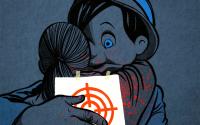Fernand Braudel Center, Binghamton University http://fbc.binghamton.edu/commentr.htm Oct. 15, 2004 "The Referendum" The U.S. elections on November 2 will be a referendum on George W. Bush and the war in Iraq. If the entire world had a vote, Bush would lose overwhelmingly. He'd probably get a maximum of 20% of the vote. Even in countries where the governments have supported U.S. policy - Great Britain, Italy, Poland, Pakistan - the majority of the population thinks the war was at the least a serious error of political judgment, at worst an illegal and immoral act. Bush would no doubt lose in Iraq itself. But of course, the whole world does not have a vote. Only U.S. citizens do. And they are far more equally divided than the rest of the world. When the U.S. invaded Iraq in April 2003, a good majority of the U.S. population supported the government. But this support has steadily eroded since, and today, a majority of the population (but only a narrow majority) think Bush made a bad mistake. Actually the polls show a curious feature. If one asks a question about Iraq, Bush does not do well and is doing worse each day. But if the pollster asks instead about the "war against terrorism" or about so-called homeland security, a majority think that Bush is doing well or at least would do better than his opponent. So what are the polls measuring? When the question is about Iraq, the pollsters are measuring a concrete phenomenon - Iraqi stability, the strength of the insurrection. And what the U.S. public sees is that each day U.S. and Iraqi lives are lost, and there is no clear indication that the situation will improve in any short horizon. Even the Bush administration admits this, saying only that, although the situation in Iraq may get worse still, it will eventually get better. But when the poll questions are about terrorism, what the answers measure is not something concrete but rather an amorphous fear about an ogre out there, hard to pin down, called Islamic fundamentalism, or al-Qaeda, or just "terrorists". And since it is amorphous and for the most part hidden, reaction to it is based more on emotion than on careful analysis. When the pollsters tap U.S. fears, many (perhaps most) respondents are answering not in terms of solving real problems but in terms of giving expression to their psychic desperation. The newspapers each day may indicate that the Iraq war has not in fact weakened al-Qaeda significantly but has probably strengthened it. Nonetheless, this doesn't seem to hurt Bush as much as one might expect. Bush banks on support for his macho, black-and-white portrait of the situation. He seeks to exude unbudgeable strength, and a portion of the electorate responds to that stance. Listening to the two candidates debate the issues, it is clear that they are talking to pervasive fears about the future. What Bush underlines is fear of an enemy. And he justifies everything he does as the way to respond to that enemy. What Kerry underlines is fear of decline. He argues that Bush has diminished the status and power of the United States in the world by his incompetence in foreign policy, by "fighting the wrong war at the wrong time and the wrong place." He argues that U.S. jobs are disappearing, especially for those in manufacturing, pointing out that Bush is the first president in seventy years (that is, since the 1929 depression) during whose term of office jobs have actually decreased. He argues that Americans need to fear for their pensions and that Bush's proposals on social security will make matters still worse. And heargues that Bush's fiscal irresponsibility endangers the country's solvency and the future standard of living of the children of America. To all of this, Bush responds by saying that he is optimistic about the "march of freedom throughout the world." But having said that, he returns immediately to the theme that the U.S. is in great danger, a danger whose solution lies primarily in U.S. hands, and that Kerry will be weak in facing the dangers. So, it's fear, fear, fear. With so much smoke, is there fire? The last time the American people were so afraid was during the depression that started in 1929. And when Franklin Roosevelt was elected president, he famously said in his inaugural address in 1933: "the only thing we have to fear is fear itself." Roosevelt offered a New Deal, a welfare state, a legitimation of trade-unions, a "good neighbor" policy in Latin America. And when the U.S. was attacked at Pearl Harbor and entered the Second World War, he offered the "four freedoms" which included the "freedom from fear." In this period the American people recovered its self-esteem, and once again felt good about itself and its role in the world. This lasted through the presidencies of Truman, Eisenhower, Kennedy, and the first years of Lyndon Johnson. The Vietnam War was the shock it was both because the self-image of the United States came under attack from within the U.S. and because, with all its military power, the U.S. couldn't seem to win the war. There followed thirty years of uncertainty and introspection by the American public, which it found difficult to handle. Carter expressed this uncertainty publicly and he was rejected for the smiling Ronald Reagan who spoke of "the city on a hill" - the dream once again of a pure and morally triumphant America. The collapse of the Soviet Union seemed to verify that dream. But it was quickly followed by the defiance of Saddam Hussein and ethnic purifications in the Balkans and Africa which, despite U.S. unquestioned military power, it couldn't seem to contain effectively. The fears were already rising when Osama bin Laden successfully attacked the U.S. at home and Bush seized the opportunity to pursue the long-planned drive of the neo-cons to invade Iraq. The expectation was that this invasion would restore unquestioned U.S. hegemony in the world-system. In fact, it has weakened it further. And the U.S. public senses this, if murkily. So, what can Americans do? They do not know, but they will vote. And it will be a vote either for Bush or against Bush. We shall see. by Immanuel Wallerstein [Copyright by Immanuel Wallerstein. All rights reserved. Permission is granted to download, forward electronically or e-mail to others and to post this text on non-commercial community Internet sites, provided the essay remains intact and the copyright note is displayed. To translate this text, publish it in printed and/or other forms, including commercial Internet sites and excerpts, contact the author at [email protected]; fax: 1-607-777-4315. These commentaries, published twice monthly, are intended to be reflections on the contemporary world scene, as seen from the perspective not of the immediate headlines but of the long term.]
Canlı Yayın
Türkiye ve dünyadan barış ve adaletin seslerine yeniden...
Ekolojiden siyasete, edebiyattan müziğe Açık Radyo'da haftanın öne çıkan gündemleri mail kutunuzda!
İletişim
Anafor Radyo Yayıncılık A.Ş.
Hacımimi Mahallesi, Lüleci Hendek Caddesi
Koltukçular Çıkmazı No 7 Kat 1-2
Tophane, 34425, Beyoğlu, İstanbul, TR
Telefon: +90 212 343 4040
Faks: +90 212 232 3219
E-posta: [email protected]






